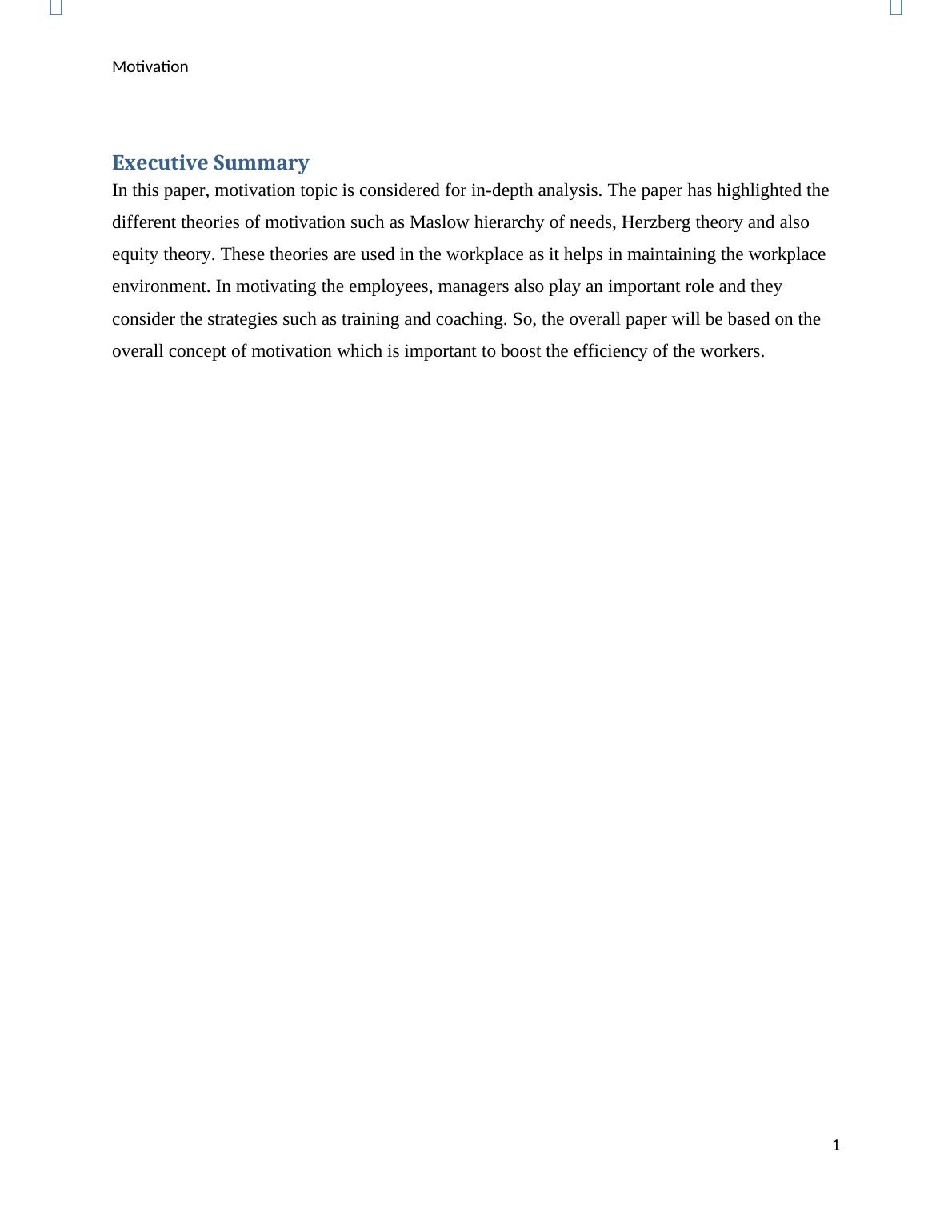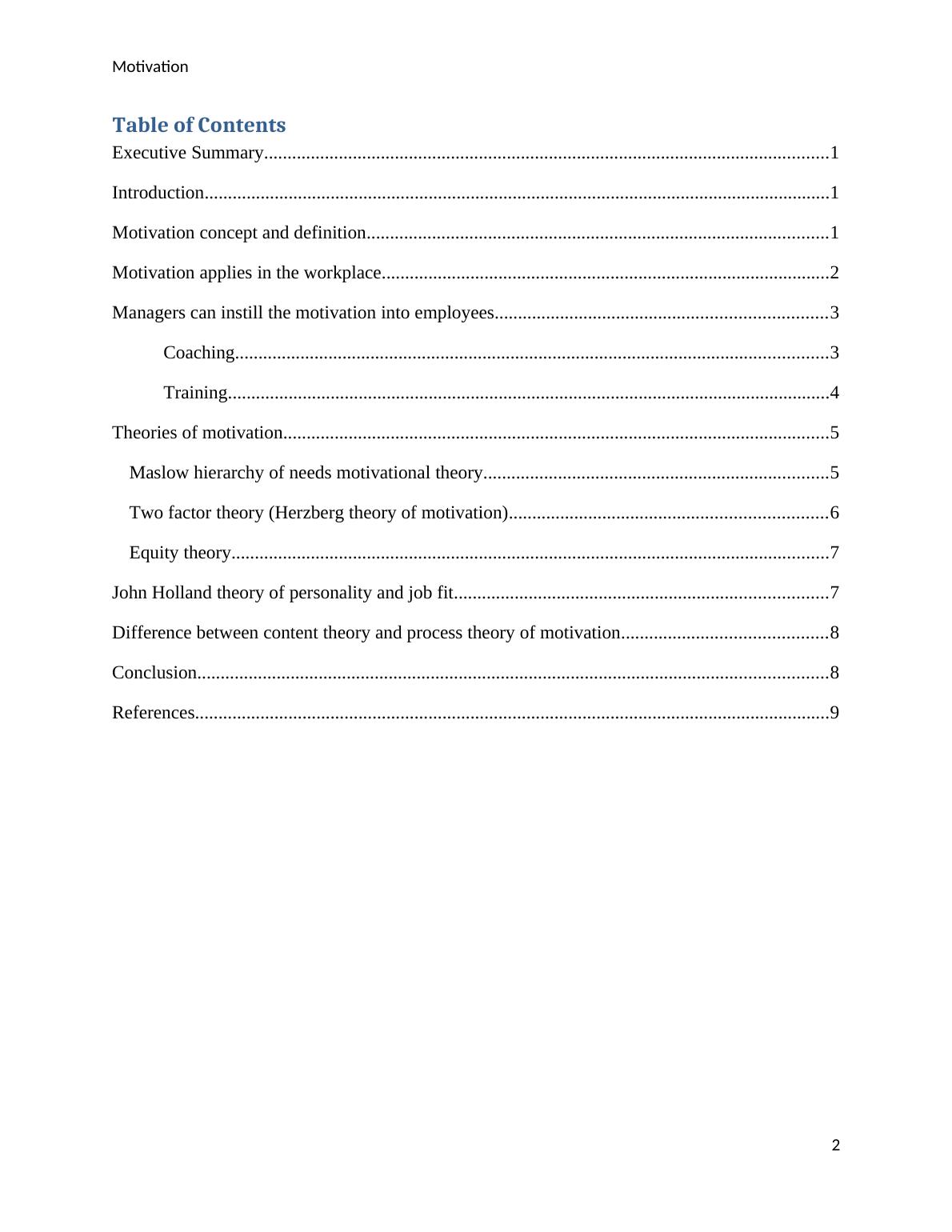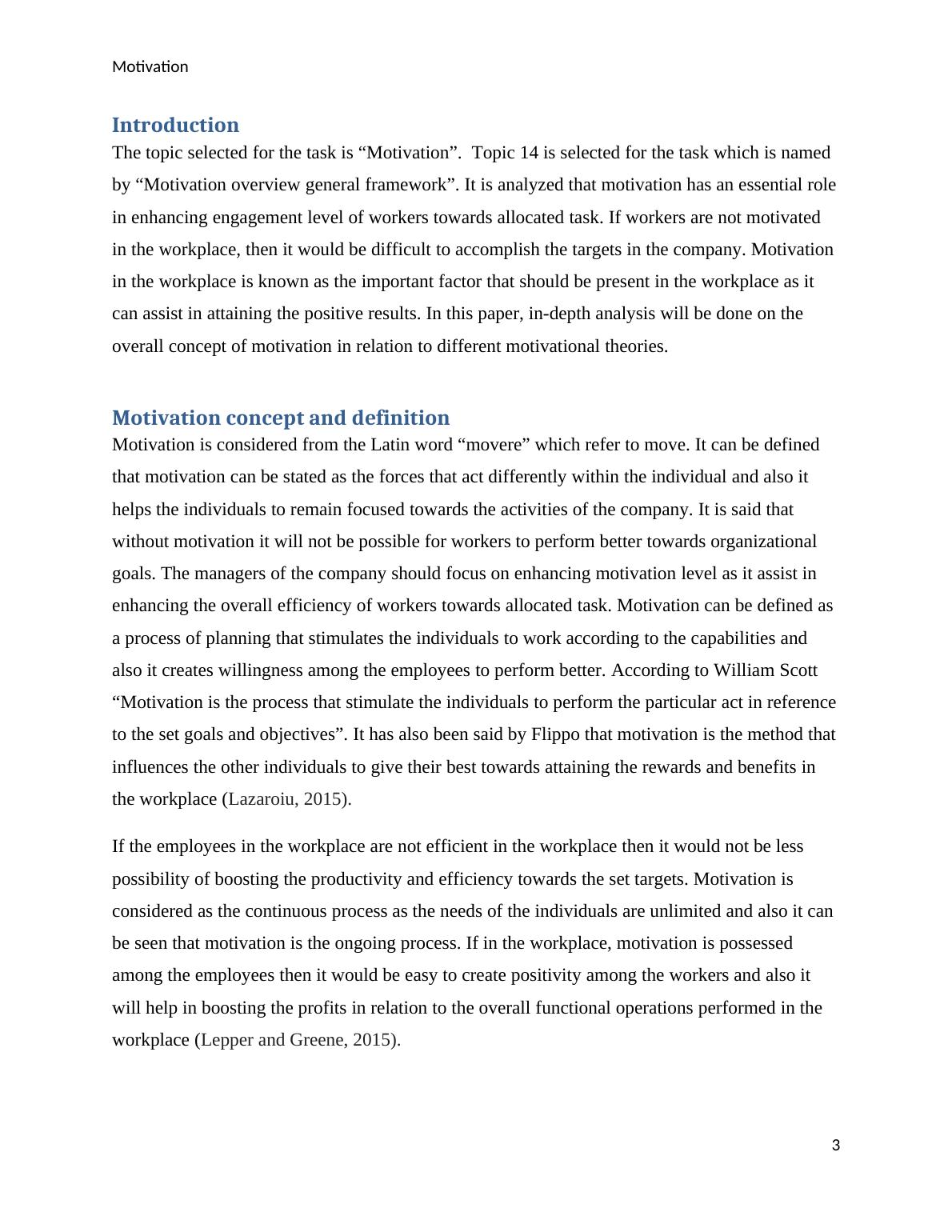Motivation: Theories and Strategies for Workplace Engagement
Added on 2022-11-26
14 Pages3786 Words477 Views
Management and
Organization in Global
environment
Organization in Global
environment

Motivation
Executive Summary
In this paper, motivation topic is considered for in-depth analysis. The paper has highlighted the
different theories of motivation such as Maslow hierarchy of needs, Herzberg theory and also
equity theory. These theories are used in the workplace as it helps in maintaining the workplace
environment. In motivating the employees, managers also play an important role and they
consider the strategies such as training and coaching. So, the overall paper will be based on the
overall concept of motivation which is important to boost the efficiency of the workers.
1
Executive Summary
In this paper, motivation topic is considered for in-depth analysis. The paper has highlighted the
different theories of motivation such as Maslow hierarchy of needs, Herzberg theory and also
equity theory. These theories are used in the workplace as it helps in maintaining the workplace
environment. In motivating the employees, managers also play an important role and they
consider the strategies such as training and coaching. So, the overall paper will be based on the
overall concept of motivation which is important to boost the efficiency of the workers.
1

Motivation
Table of Contents
Executive Summary.........................................................................................................................1
Introduction......................................................................................................................................1
Motivation concept and definition...................................................................................................1
Motivation applies in the workplace................................................................................................2
Managers can instill the motivation into employees.......................................................................3
Coaching...............................................................................................................................3
Training.................................................................................................................................4
Theories of motivation.....................................................................................................................5
Maslow hierarchy of needs motivational theory..........................................................................5
Two factor theory (Herzberg theory of motivation)....................................................................6
Equity theory................................................................................................................................7
John Holland theory of personality and job fit................................................................................7
Difference between content theory and process theory of motivation............................................8
Conclusion.......................................................................................................................................8
References........................................................................................................................................9
2
Table of Contents
Executive Summary.........................................................................................................................1
Introduction......................................................................................................................................1
Motivation concept and definition...................................................................................................1
Motivation applies in the workplace................................................................................................2
Managers can instill the motivation into employees.......................................................................3
Coaching...............................................................................................................................3
Training.................................................................................................................................4
Theories of motivation.....................................................................................................................5
Maslow hierarchy of needs motivational theory..........................................................................5
Two factor theory (Herzberg theory of motivation)....................................................................6
Equity theory................................................................................................................................7
John Holland theory of personality and job fit................................................................................7
Difference between content theory and process theory of motivation............................................8
Conclusion.......................................................................................................................................8
References........................................................................................................................................9
2

Motivation
Introduction
The topic selected for the task is “Motivation”. Topic 14 is selected for the task which is named
by “Motivation overview general framework”. It is analyzed that motivation has an essential role
in enhancing engagement level of workers towards allocated task. If workers are not motivated
in the workplace, then it would be difficult to accomplish the targets in the company. Motivation
in the workplace is known as the important factor that should be present in the workplace as it
can assist in attaining the positive results. In this paper, in-depth analysis will be done on the
overall concept of motivation in relation to different motivational theories.
Motivation concept and definition
Motivation is considered from the Latin word “movere” which refer to move. It can be defined
that motivation can be stated as the forces that act differently within the individual and also it
helps the individuals to remain focused towards the activities of the company. It is said that
without motivation it will not be possible for workers to perform better towards organizational
goals. The managers of the company should focus on enhancing motivation level as it assist in
enhancing the overall efficiency of workers towards allocated task. Motivation can be defined as
a process of planning that stimulates the individuals to work according to the capabilities and
also it creates willingness among the employees to perform better. According to William Scott
“Motivation is the process that stimulate the individuals to perform the particular act in reference
to the set goals and objectives”. It has also been said by Flippo that motivation is the method that
influences the other individuals to give their best towards attaining the rewards and benefits in
the workplace (Lazaroiu, 2015).
If the employees in the workplace are not efficient in the workplace then it would not be less
possibility of boosting the productivity and efficiency towards the set targets. Motivation is
considered as the continuous process as the needs of the individuals are unlimited and also it can
be seen that motivation is the ongoing process. If in the workplace, motivation is possessed
among the employees then it would be easy to create positivity among the workers and also it
will help in boosting the profits in relation to the overall functional operations performed in the
workplace (Lepper and Greene, 2015).
3
Introduction
The topic selected for the task is “Motivation”. Topic 14 is selected for the task which is named
by “Motivation overview general framework”. It is analyzed that motivation has an essential role
in enhancing engagement level of workers towards allocated task. If workers are not motivated
in the workplace, then it would be difficult to accomplish the targets in the company. Motivation
in the workplace is known as the important factor that should be present in the workplace as it
can assist in attaining the positive results. In this paper, in-depth analysis will be done on the
overall concept of motivation in relation to different motivational theories.
Motivation concept and definition
Motivation is considered from the Latin word “movere” which refer to move. It can be defined
that motivation can be stated as the forces that act differently within the individual and also it
helps the individuals to remain focused towards the activities of the company. It is said that
without motivation it will not be possible for workers to perform better towards organizational
goals. The managers of the company should focus on enhancing motivation level as it assist in
enhancing the overall efficiency of workers towards allocated task. Motivation can be defined as
a process of planning that stimulates the individuals to work according to the capabilities and
also it creates willingness among the employees to perform better. According to William Scott
“Motivation is the process that stimulate the individuals to perform the particular act in reference
to the set goals and objectives”. It has also been said by Flippo that motivation is the method that
influences the other individuals to give their best towards attaining the rewards and benefits in
the workplace (Lazaroiu, 2015).
If the employees in the workplace are not efficient in the workplace then it would not be less
possibility of boosting the productivity and efficiency towards the set targets. Motivation is
considered as the continuous process as the needs of the individuals are unlimited and also it can
be seen that motivation is the ongoing process. If in the workplace, motivation is possessed
among the employees then it would be easy to create positivity among the workers and also it
will help in boosting the profits in relation to the overall functional operations performed in the
workplace (Lepper and Greene, 2015).
3

End of preview
Want to access all the pages? Upload your documents or become a member.
Related Documents
Boosting Motivation in the workplacelg...
|12
|343
|172
Work Life Balance and Employee Motivation: Theories and Recommendationslg...
|12
|3482
|61
Importance of Knowledge of Organization Behaviour for Managerslg...
|8
|2062
|75
Managing and Leading People: Role of Line Managers and Leaders in Motivating and Engaging Employees for Organizational Renewallg...
|13
|4162
|47
Engaging and Motivating Staff: The Key to Strategic Human Resource Managementlg...
|12
|3653
|462
Content and Process Theorylg...
|6
|1352
|63
